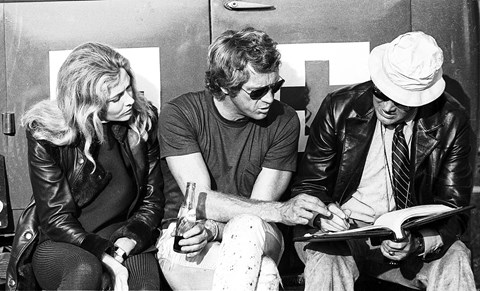► Documentary explaining Le Mans film
► Truth behind McQueen’s flawed race odyssey
► Like the film, you should watch it
Le Mans is a terrible movie. The storyline is thin and there’s no dialogue for the first 38 minutes. When it was made in 1970 it had the biggest budget of any Steve McQueen film to date, but it still managed to go over-budget and its chaotic production cost him close friends and creative collaborators. The critics hated it and it was a box-office flop. Yet it now has a cult following, because it remains arguably the most evocative, accurate representation of one of the most exciting, glamorous eras in motorsport. That was really all McQueen wanted to do: he didn’t want much of a script or storyline. ‘I don’t think there is any racing driver who could tell you why he races,’ he said. ‘But I think that he could probably show you.’
The sad story of Le Mans has been told before, but a new documentary tells it afresh with remarkable new material. In garages and long-forgotten archives the producers found hours of behind-the-scenes footage: Le Mans was previously thought to have been a ‘closed set’. And hidden under a stage in a studio in LA they uncovered the original rushes: the famed ‘million feet of film’ reported to have been shot, but which was thought to have been destroyed. Lost footage of Porsche 917s and Ferrari 512s thundering down Mulsanne deserves to be seen on the big screen, so the documentary is being given a cinema release.

But although the material is better than the bad TV footage the producers of Senna had to work with, the story isn’t as compelling or important, and the storytelling not as polished. Steve McQueen: The Man and Le Mans could do with another edit, not least to the title. The narrative is pleasingly free-form and the recordings of interviews with McQueen – some also newly discovered – allow him to tell his own story. The contributors are impressive, from Swedish actress Louise Edlind, who became an MP and hasn’t spoken about the film for decades, to British racing legends Derek Bell and David Piper, who drove in the race scenes. The film reveals a few new facts which will be of interest to McQueen or motorsport obsessives, and it’s of wider interest as a document of how chaotic Hollywood could be: the Le Mans crew shot for months without a script, which explains a lot. But the film feels repetitive in places and there are some cheesy documentary tropes, such as the interviewees all being filmed in front of the same weathered tarpaulin, and being asked to give long, meaningful stares into the camera.
It’s an okay documentary about a flawed movie. But like Le Mans, you should go see it anyway.